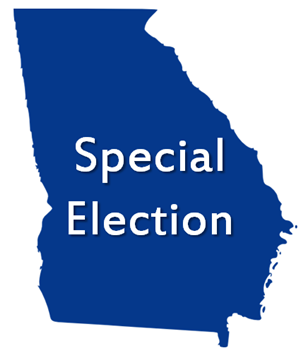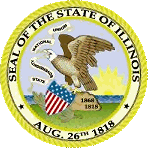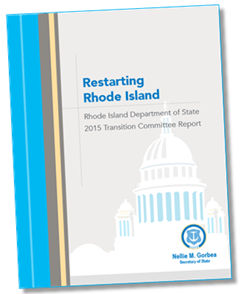May 19, 2015 •
Georgia Special Election Set for State House District 24
The Office of the Secretary of State has given notice of a special election for state House District 24. The election will be held on June 16, 2015, with a runoff election on July 14, 2015, if needed. The vacancy […]
 The Office of the Secretary of State has given notice of a special election for state House District 24.
The Office of the Secretary of State has given notice of a special election for state House District 24.
The election will be held on June 16, 2015, with a runoff election on July 14, 2015, if needed.
The vacancy was created by the May 11 resignation of Mark Hamilton, who announced plans to accept a private sector job in Tennessee.
April 17, 2015 •
Deadline Extended for Illinois Lobbyist Expenditure Reports
The Illinois Secretary of State Index Department has extended the filing deadline for the Lobbyist Expenditure Report covering the period of April 1 to April 15, 2015. Due to an ongoing service issue on the website, the Lobbyist Registration and […]
 The Illinois Secretary of State Index Department has extended the filing deadline for the Lobbyist Expenditure Report covering the period of April 1 to April 15, 2015.
The Illinois Secretary of State Index Department has extended the filing deadline for the Lobbyist Expenditure Report covering the period of April 1 to April 15, 2015.
Due to an ongoing service issue on the website, the Lobbyist Registration and Reporting System has been inaccessible to some users.
The April 20 deadline has been extended to April 22, 2015, at 11:59 p.m.
March 3, 2015 •
Recommendations Made to Change RI Lobbying Laws
Rhode Island Secretary of State Nellie M. Gorbea’s transition committee has issued recommendations “to improve the public’s perception of their government.” In the committee’s report, they endorse the creation of a lobbying task force to “guide efforts to strengthen, simplify […]
 Rhode Island Secretary of State Nellie M. Gorbea’s transition committee has issued recommendations “to improve the public’s perception of their government.”
Rhode Island Secretary of State Nellie M. Gorbea’s transition committee has issued recommendations “to improve the public’s perception of their government.”
In the committee’s report, they endorse the creation of a lobbying task force to “guide efforts to strengthen, simplify and clarify Rhode Island’s lobbying law.” Calling the current lobbying laws antiquated, the committee recommends increasing both the fines for violations and the fees for registration. The report argues the increases “will help incentivize lobbyists to be compliant” with the state’s laws. Other recommendations include overhauling the Lobby Tracker reporting system, more “robust” education about the lobbying laws, and increased oversight of lobbyists.
The report makes other policy suggestions unrelated to lobbying, such as reviewing the photo ID requirement at polling places for its possible impact on suppressing voter turnout.
January 16, 2013 •
Missouri Secretary of State Curbs Lobbyist Gifts to Staff
Office now has more limited policy than state law requires
 Secretary of State Jason Kander, sworn in on January 14, 2013, has adopted a new ethics policy barring the staff in his office from accepting gifts from lobbyists.
Secretary of State Jason Kander, sworn in on January 14, 2013, has adopted a new ethics policy barring the staff in his office from accepting gifts from lobbyists.
Kander’s stated purpose was to give the public confidence that the office is being run in a nonpartisan and fair way.
State administrative policy already curtails what state employees may accept from lobbyists, but agencies are free to adopt stricter guidelines.
December 28, 2012 •
Missouri Ethics Commission Executive Director Leaving for New Job
Julie Allen will be working for Secretary of State’s office
 Julie Allen, the executive director of the Missouri Ethics Commission, will be leaving to work at the Secretary of State’s office as the director of elections and information technology.
Julie Allen, the executive director of the Missouri Ethics Commission, will be leaving to work at the Secretary of State’s office as the director of elections and information technology.
For full news coverage, be sure to read:
“Missouri ethics chief headed to Kander’s office” by The Associated Press in Connectmidmissouri.com.
“Kander hires executive director of Missouri Ethics Commission to oversee state elections” by Jo Mannies in the St. Louis Beacon.
October 3, 2012 •
Nevada SOS Millers Wants Campaign Finance Laws Strengthened
Proposes Bill Draft Resolution
 Nevada Secretary of State Ross Miller has proposed a bill draft resolution for the 2013 legislature to increase the accountability of candidates and public officials.
Nevada Secretary of State Ross Miller has proposed a bill draft resolution for the 2013 legislature to increase the accountability of candidates and public officials.
Secretary Miller advocates changes to the current campaign finance laws to clarify who is required to disclose contributions and expenditures when making independent expenditures or electioneering communications. Other changes put forth include requiring reporting within 72 hours for contributions received in excess of $1000, allowing the Secretary of State’s office to seek greater authority and greater penalties for campaign finance violations, and requiring every expense made from a candidate’s campaign account to be report.
Additionally, the Secretary is proposing an overhaul of the law regarding gifts given to public officials in order to “significantly restrict the ability of candidates and public officials to receive ‘gifts’ from donors who may pose a conflict of interest”, according to a press release from the Secretary’s office.
Assemblymen Marcus Conklin and Pat Hickey, and senate candidate Sheila Leslie, have expressed interest in the ideas. The Nevada Legislature is scheduled to begin its next session on February 4, 2013.
February 23, 2012 •
Changes Made to Campaign Finance Rules in Colorado
Critics Say Changes Beyond Secretary of State’s Authority
 Secretary of State Scott Gessler announced on Wednesday the adoption of a recodified set of rules concerning Colorado campaign financing aimed at simplifying the state’s campaign finance process. Among the most notable changes to be made, total fines for late or incomplete campaign finance reports are now to be limited to $50 per day for up to 180 days for a maximum fine of $9,000.
Secretary of State Scott Gessler announced on Wednesday the adoption of a recodified set of rules concerning Colorado campaign financing aimed at simplifying the state’s campaign finance process. Among the most notable changes to be made, total fines for late or incomplete campaign finance reports are now to be limited to $50 per day for up to 180 days for a maximum fine of $9,000.
Additionally, Gessler’s office will continue to utilize the $5,000 threshold at which issue committees must register and report, created by Gessler’s adoption of Campaign and Political Finance Rule 4.27, despite a state district court ruling Gessler did not have the authority to increase the threshold from the constitutionally-mandated figure of $200 after a finding by the court determining the threshold to be too burdensome.
Also, in accordance with the Colorado Supreme Court’s decision released the day prior to Gessler’s release of the recodified campaign finance rules, a 527 political group is limited to accepting up to $550 from any person every two years if the 527 group is engaging in express advocacy for a particular candidate by use of certain “magic words” such as “vote for” or “elect.”
Critics of Gessler have claimed the changes made are outside his authority and a legal challenge is expected. The rules are scheduled to temporarily take effect on March 7, 2012, with the rules being permanently effective on March 30, 2012.
January 18, 2012 •
Nevada Now Has Online Campaign Finance Database
Secretary of State says new searchable system will “bring a whole level of transparency” to those seeking campaign finance data.

Nevada Secretary of State Ross Miller has announced the launch of a new searchable online database for the state’s campaign finance data. Named Aurora, the system began at midnight last night.
For more information read “Nevada Secretary Of State Launches Aurora, A Searchable Database For Campaign Finance Information” from the Nevada News Bureau.
According to the news release on the the Secretary of State’s web site:
The Contribution Search and Expenditure Search functions will allow users to search results by the following criteria:
– Individual Candidates
– Political Races
– Groups
– Contributions, including by amount, date range and similar addresses
– Contributors
– Expenditure Recipients
November 28, 2011 •
New Campaign Finance Rules Proposed in Colorado
Secretary of State Seeks Better Organization, Clarity with Proposed Changes
 Secretary of State Scott Gessler has issued a notice of proposed rulemaking in regards to the Colorado Secretary of State Rules Concerning Campaign and Political Finance, 8 CCR 1505-6. Gessler has proposed a recodification of the rules in their entirety in an effort to improve organization and readability, clarify existing laws and regulations, and address questions arising under Colorado campaign and political finance laws.
Secretary of State Scott Gessler has issued a notice of proposed rulemaking in regards to the Colorado Secretary of State Rules Concerning Campaign and Political Finance, 8 CCR 1505-6. Gessler has proposed a recodification of the rules in their entirety in an effort to improve organization and readability, clarify existing laws and regulations, and address questions arising under Colorado campaign and political finance laws.
Among the more notable changes, the proposed rules would limit fines for late or incomplete campaign finance reports to no more than $50 a day for 180 days, maximized to $9,000. The rules would also continue to utilize the $5,000 threshold at which issue committees would need to register and report, created by Gessler’s adoption of Campaign and Political Finance Rule 4.27, despite a recent state district court ruling that Gessler did not have the authority to increase the threshold from the constitutionally-mandated figure of $200 despite a finding of the threshold to be too burdensome in the recent Colorado case of Sampson v. Buescher.
A hearing regarding these proposed changes is scheduled for December 15, 2011 from 9:00 a.m. to 12:00 p.m. in the Blue Spruce Conference Room on the second floor of the Secretary of State’s Office.
November 22, 2011 •
Alabama Releases 2012 Campaign Finance Filing Calendar
Contains Increased PAC Filing Requirements
 The Alabama Secretary of State’s office has released the 2012 campaign finance filing calendar.
The Alabama Secretary of State’s office has released the 2012 campaign finance filing calendar.
The calendar incorporates the changes enacted by the Alabama Legislature as public acts 2011-687 and 2011-697 including increased frequency of reporting required by political action committees.
November 21, 2011 •
State Court Rules Against Colorado Secretary of State
Appeal of Ruling is Planned
 The Denver District Court has ruled Colorado Secretary of State Scott Gessler did not have the authority to raise contribution thresholds concerning when state issue committees have to register and report their activity.
The Denver District Court has ruled Colorado Secretary of State Scott Gessler did not have the authority to raise contribution thresholds concerning when state issue committees have to register and report their activity.
At issue was Gessler’s adoption of Campaign and Political Finance Rule 4.27, which increased from $200 to $5,000 the threshold at which an issue committee must register and report. The $200 threshold, set by the Colorado Constitution, was found to be too burdensome in the recent Colorado case of Sampson v. Buescher.
The court determined that, despite the conflict, Gessler’s alteration of the constitutionally mandated $200 threshold was an impermissible unilateral alteration of the Colorado Constitution. Gessler plans to appeal the ruling.
August 23, 2011 •
Michigan Bureau of Elections Now Offers Campaign Finance Twitter Feed
Secretary of State’s Office Makes Announcement
 For the latest information on campaign finance requirements in Michigan, the state’s Bureau of Elections now has a Twitter account to keep you informed. The Twitter feed will include information about reporting deadlines, electronic filing updates, and announcements regarding training sessions. You can follow the Twitter account at @MichCFR.
For the latest information on campaign finance requirements in Michigan, the state’s Bureau of Elections now has a Twitter account to keep you informed. The Twitter feed will include information about reporting deadlines, electronic filing updates, and announcements regarding training sessions. You can follow the Twitter account at @MichCFR.
According to a Michigan Department of State press release, “Secretary of State Ruth Johnson announced today that the Bureau of Elections is launching a Twitter account to alert candidates, committees and those interested in campaign finance of reports detailing campaign contributions and expenditures.”
For another way to receive the latest information, the release also mentions that the Secretary of State also has a Facebook presence.
June 28, 2011 •
West Virginia to Review Public Funding Program
Secretary of State Tennant will discuss the issue with the governor and attorney general.
 In response to the U.S. Supreme Court decision which struck down Arizona’s public funding matching system, West Virginia Secretary of State Natalie Tennant has indicated that West Virginia will review its own public funding program.
In response to the U.S. Supreme Court decision which struck down Arizona’s public funding matching system, West Virginia Secretary of State Natalie Tennant has indicated that West Virginia will review its own public funding program.
West Virginia’s public funding program, approved by lawmakers in 2010, is set to begin with a pilot project involving two state Supreme Court seats up for election in the 2012 general election. West Virginia’s law would give candidates who opt into the program more state money as spending by their opponents or independent expenditures by third parties increased.
Tennant has stated that she plans to meet and discuss this issue with Governor Earl Ray Tomblin and Attorney General Darrell McGraw.
Photo of Natalie Tennant courtesy of Natalie Tennant on Wikipedia.
Issue Committee Threshold Central to New Colorado Complaint
 Colorado Common Cause and Colorado Ethics Watch have filed a complaint against Colorado Secretary of State Scott Gessler alleging Gessler illegally “exceeded his authority to administer and enforce campaign finance laws by dramatically increasing the constitutional threshold for regulation of issue committees.”
Colorado Common Cause and Colorado Ethics Watch have filed a complaint against Colorado Secretary of State Scott Gessler alleging Gessler illegally “exceeded his authority to administer and enforce campaign finance laws by dramatically increasing the constitutional threshold for regulation of issue committees.”
At issue is Gessler’s recent adoption of Campaign and Political Finance Rule 4.27, which increased from $200 to $5,000 the threshold at which an issue committee must register and report. The $200 threshold, set by the Colorado Constitution, was found to be too burdensome in the recent Colorado case of Sampson v. Buescher. However, the issue of whether the court determined the $200 threshold to be unconstitutional, as Gessler contended to be the case in a statement released concerning the increased threshold, is central to this action.
“The Secretary is under the mistaken impression that he has authority to rewrite campaign finance laws, not merely make rules to enforce those laws,” said Luis Toro, Executive Director of Colorado Ethics Watch. “Disclosure thresholds are clearly not within the authority of the Secretary of State to change.”
State and Federal Communications, Inc. provides research and consulting services for government relations professionals on lobbying laws, procurement lobbying laws, political contribution laws in the United States and Canada. Learn more by visiting stateandfed.com.


